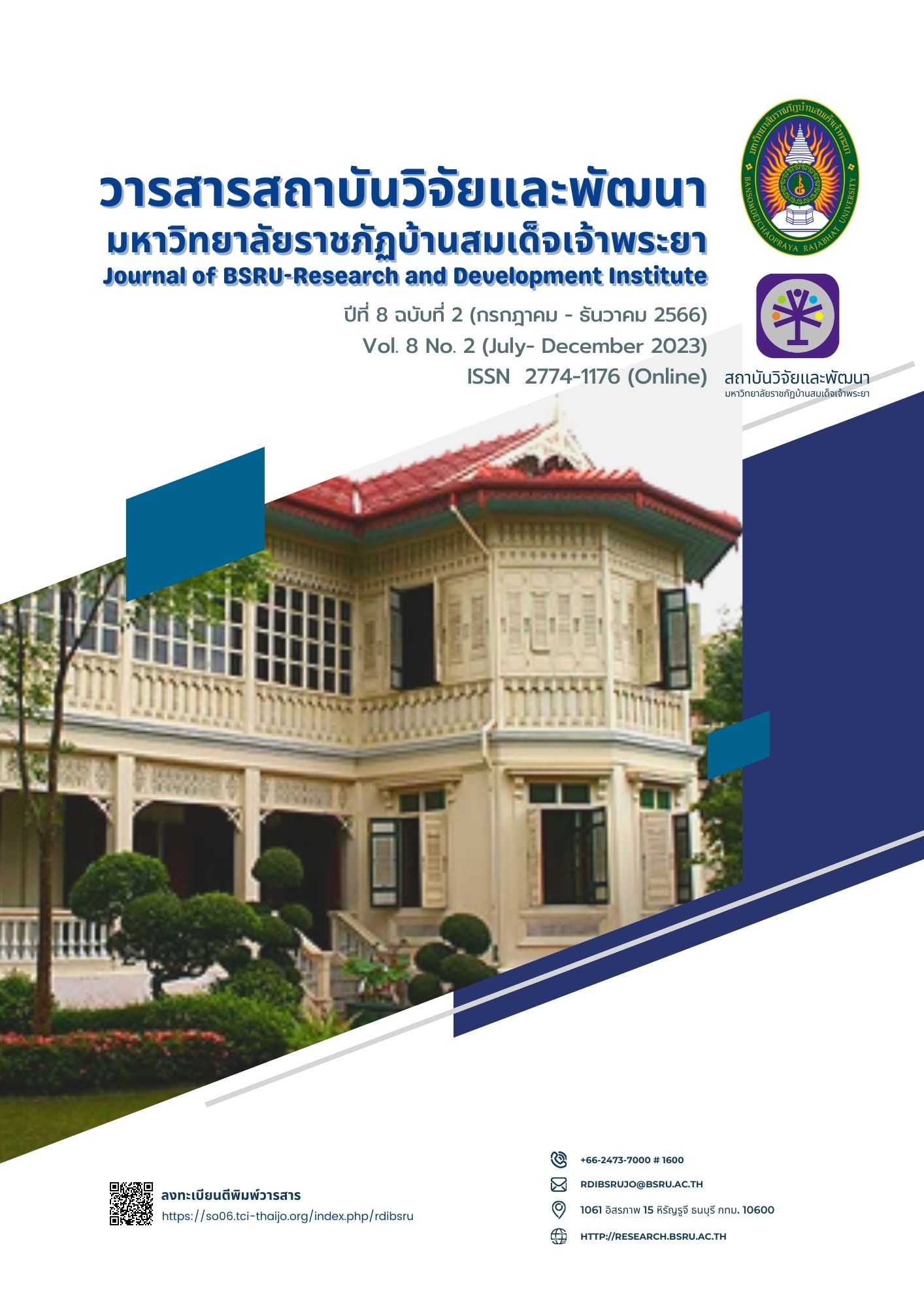การพัฒนาเกมเพื่อการเรียนรู้โดยใช้กลยุทธ์เกมมิฟิเคชัน เพื่อส่งเสริมการคิดเชิงคำนวณ รายวิชาพื้นฐานวิทยาศาสตร์ สาระเทคโนโลยี (วิทยาการคำนวณ)สำหรับนักเรียนระดับมัธยมศึกษาเขตธนบุรี
คำสำคัญ:
การคิดเชิงคำนวณ, เกมมิฟิเคชัน, วิทยาการคำนวณบทคัดย่อ
งานวิจัยนี้มีวัตถุประสงค์เพื่อ 1) เพื่อพัฒนาและหาประสิทธิภาพ เกมเพื่อการเรียนรู้โดยใช้กลยุทธ์เกมมิฟิเคชัน เพื่อส่งเสริมการคิดเชิงคำนวณ รายวิชาพื้นฐานวิทยาศาสตร์ สาระเทคโนโลยี (วิทยาการคำนวณ) สำหรับนักเรียนระดับมัธยมศึกษาเขตธนบุรี 2) เพื่อวัดระดับการคิดเชิงคำนวณของนักเรียน 3) เพื่อศึกษาความพึงพอใจของนักเรียนระดับมัธยมศึกษา ที่มีต่อเกมเพื่อการเรียนรู้โดยใช้กลยุทธ์เกมมิฟิเคชัน เพื่อส่งเสริมการคิดเชิงคำนวณ กลุ่มตัวอย่างคือ นักเรียนชั้นมัธยมศึกษาปีที่ 2 โรงเรียนวัดอินทาราม กรุงเทพมหานคร ในภาคเรียนที่ 1 ปีการศึกษา 2566 ได้มาจากการสุ่มแบบแบ่งกลุ่ม (Cluster Random Sampling) โดยใช้ห้องเรียนเป็นหน่วยในการสุ่มด้วยการจับสลากมา 1 ห้องเรียน ได้กลุ่มตัวอย่างเป็นนักเรียนชั้นมัธยมศึกษาปีที่ 2/3 จำนวน 25 คน
ผลการวิจัยพบว่า 1) ผลการพัฒนาและหาประสิทธิภาพของเกมเพื่อการเรียนรู้โดยใช้กลยุทธ์เกมมิฟิเคชัน เพื่อส่งเสริมการคิดเชิงคำนวณ โดยรวมอยู่ในระดับดีมาก ( = 4.82, S.D. = 0.40) 2) นักเรียนมีระดับการคิดเชิงคำนวณอยู่ในระดับดี ( = 74.80, S.D. = 2.87) 3) ผลการประเมินความถึงพอใจของนักเรียนที่มีต่อเกมเพื่อการเรียนรู้โดยใช้กลยุทธ์เกมมิฟิเคชัน เพื่อส่งเสริมการคิดเชิงคำนวณโดยรวมอยู่ในระดับมากที่สุด ( = 4.84, S.D. = 0.38)
Downloads
เอกสารอ้างอิง
กระทรวงศึกษาธิการ. (2551). หลักสูตรแกนกลางการศึกษาขั้นพื้นฐานพุทธศักราช 2551. กรุงเทพมหานคร: โรงพิมพ์ชุมนุมสหกรณ์การเกษตรแห่งประเทศไทย จำกัด.
ชนัตถ์ พูนเดช และธนิตา เลิศพรกุลรัตน์. (2559). แนวทางการจัดการเรียนรู้ด้วยแนวคิดเกมมิฟิเคชัน. วารสารศึกษาศาสตร์ มหาวิทยาลัยนเรศวร, 18(3), 331-339.
ประหยัด จิระวรพงศ์. (2559). Games Based Learning : สื่อการเรียนรู้แบบใหม่ของไทย. สืบค้นเมื่อ 22กุมภาพันธ์ 2565 จาก http://nuybeam.blogspot.com/2010/08/garm-based-learning.html
พิชญ์ อำนวยพร, เสกสรรค์ แย้มพินิจ, โสพล มีเจริญ, และ สุธิวัชร ศุภลักษณ์. (2562). การพัฒนาสื่อการเรียนรู้ประเภทเกม โดยใช้กลยุทธ์เกมมิฟิเคชัน เพื่อส่งเสริมการคิดเชิงคำนวณ รายวิชาพื้นฐานวิทยาศาสตร์ เทคโนโลยี (วิทยาการคำนวณ) สำหรับนักเรียนชั้นประถมศึกษาปีที่ 2. วารสารวิชาการศึกษาศาสตร์ คณะศึกษาศาสตร์ มหาวิทยาลัยศรีนครินทรวิโรฒ, 20(2), 68-78.
วรานันท์ อิศรปรีดา.(2564). การพัฒนาบทเรียนแสวงรู้บนเว็บผ่านสื่อสังคมออนไลน์ที่มีประสิทธิภาพ เพื่อสร้างเสริมทักษะการคิดวิเคราะห์ การคิดเชิงประเมิน และพฤติกรรมการเรียนรู้แบบนำต้นเองของนักศึกษาครู. วารสารศึกษาศาสตร์มหาวิทยาลัยนเรศวร, 23(4), 330-342.
สถาบันส่งเสริมการสอนวิทยาศาสตร์และเทคโนโลยีกระทรวงศึกษาธิการ. (2562). คู่มือการใช้หลักสูตรสาระ
เทคโนโลยี วิทยาการคำนวณ กลุ่มสาระการเรียนรู้วิทยาศาสตร์. กรุงเทพมหานคร: สถาบันส่งเสริมวิทยาศาสตร์และเทคโนโลยี กระทรวงศึกษาธิการ.
อังคาร ปริญญาชัยศักดิ์, นิธิวดี พะเทพ, เกียรติขร โสภณาภรณ์ (2022). การจัดกลุ่มนักศึกษาสำหรับวางแผนอบรมเสริมความรู้ก่อนจบการศึกษา สาขาคอมพิวเตอร์ศึกษา มหาวิทยาลัยราชภัฏบ้านสมเด็จเจ้าพระยา ด้วยเทคนิคการเรียนรู้ของเครื่อง. Proceeding National & International Conference. Volume 2(15),1-10.
Kiryakova, G., Angelova, N., & Yordanova, L. (2014, October). Gamification in education. In Proceedings of 9th international Balkan education and science conference (Vol. 1, pp. 679-684).
Yildiz, I., Topçu E., and Kaymakci, S. (2021). The effect of gamification on motivation in the education of pre-service social studies teachers. Thinking Skills and Creativity, 42, 100907. https://doi.org/10.1016/j.tsc.2021.100907
ดาวน์โหลด
เผยแพร่แล้ว
ฉบับ
ประเภทบทความ
สัญญาอนุญาต
บทความ ข้อความ ภาพประกอบ และตารางประกอบที่ลงพิมพ์ในวารสารเป็นความคิดเห็นส่วนตัวของผู้นิพนธ์ กองบรรณาธิการไม่จำเป็นต้องเห็นตามเสมอไป และไม่มีส่วนรับผิดชอบใดๆ ถือเป็นความรับผิดชอบของผู้นิพนธ์เพียงผู้เดียว






